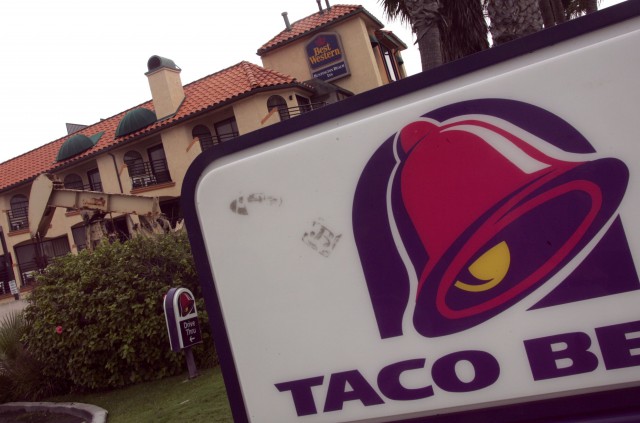
For many foodies and their lefty amigos,
These custodians of cuisine and culture rail against
the fast-food behemoth, bemoan how it mongrelizes one of the world’s
great food traditions with its chalupas and enchiritos, its Volcano
Menu and cheese roll-ups. The chain’s ubiquity makes it just another
foot soldier in corporate America’s drive toward nationwide blandness,
they’ll argue. And how insulting was that darn Chihuahua campaign from
a couple of years ago? “Yo quiero
Full disclosure: I’m one of those whiners. Ever tried one of their burritos? Blech. But with the recent death of
it’s time to praise the multibillion-dollar powerhouse. It deserves a
spot in Mexican American lore, in the gallery honoring those brave
pioneers who helped us join the melting pot — below
When Bell sold his first crunchy taco in 1951,
Americans outside the Southwest largely were unfamiliar with Mexican
society beyond
banditos and the spicy senoritas of song. It was the years before the
Great Brown Migration, and without a widespread population to introduce
Mexican dishes to the general public, the nationwide reputation of
Mexican food languished in the realm of slurs — “pepper belly,” “taco
bender” and the ever-dangerous “Montezuma’s revenge.”
But Bell — a white man operating a burger stand in
barrio — saw an opportunity. “I figured if Mexican food (sold in a
fast-food environment) was successful, potential competitors would
write it off to my location and assume the idea wouldn’t sell anywhere
else,” Bell said in his 1999 biography, “Taco Titan: The Glen Bell
Story.” He began streamlining the taco-making process, modified Mexican
foodstuffs for mainstream acceptance and opened his first
That claim is still debatable, but what’s certain is
that Bell’s mass-produced version of Mexican food — owing more to the
palate of suburban
It was a more innocent time, one in which communities welcomed
encroaching Mexican culture not with protests and vile slurs but with
an order for three hard-shell tacos, easy on the sour cream.
Competitors quickly popped up and spread “Mexican”
food to all corners of the republic long before actual Mexicans
arrived. Some kept versions of
the archetypal peon sleeping under a cactus; others modified the food
further to match local tastes (oh, how I’d love to see gourmand purists
react to
the upper Midwest whose signature breakfast burrito contains crunchy
Tater Tots). It’s now a multibillion-dollar industry, with
The company’s introduction of a culinary scaffold on
which Americans learned to crave Mexican food proved momentous to
American tastes. Without
Mexican food wouldn’t have entered our gustatory vernacular alongside
pizza, the hot dog, pita wraps and other vestiges of ethnic America.
Far from warping traditional recipes, the success of
amateur cooks could ditch the taco kit and experience the real deal.
And the continual influx of Mexican immigrants into this country
ensures that “real” Mexican fare won’t soon disappear.
More important,
became a gateway for Americans to accept Mexicans. It hasn’t been an
easy ride, of course, but one smoothed by an endless stream of refried
beans and nacho cheese. If you can sit down and enjoy the cuisine of
newcomers, then surely you can start thinking of them as fellow
citizens, right? And with
international markets, it’s making as bold a statement as any in the
immigration wars, one that’s downright revolutionary: Mexican food can
represent U.S. culture with nary a second thought.
I ate at
just to see if my bad memories of the chain were still justified. They
were. My burrito contained bland pinto beans, cheese that tasted like
chalk, all within a clammy flour tortilla. But in front of me in the
drive-through line were whites, Asians, even Mexicans, all trying to
grab a slice — scratch that, a taco — of America.
But here’s hoping they doused their grub with Tapatio instead of requesting extra packets of Border Sauce Fire — it’s still
—
(c) 2010, Los Angeles Times.
Visit the Los Angeles Times on the Internet at http://www.latimes.com/
Distributed by McClatchy-Tribune Information Services.














